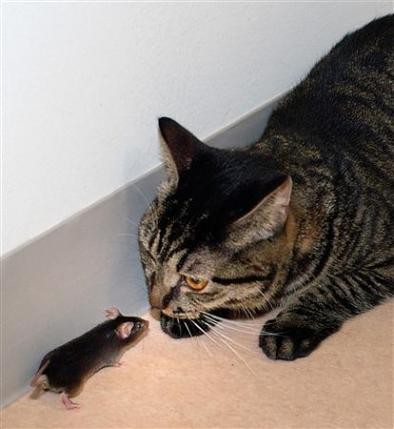A new study shows that mice that have been exposed to the scent of cat urine are less likely to escape from the felines. When baby mice whiff a chemical in the liquid waste of the bigger furry animals they do not run away to avoid the strong odor, and are thus unable to get away from the cat predators. This helps to maintain the animal food chain.
Dr. Vera Voznessenskaya, one of the study's researchers, is from the AN Severtov Institute of Ecology and Evolution located in Moscow, Russia. She explained that young mice that are less than 2 weeks old are in the "critical period" of their physical development.
The little rodents experience positive reinforcement when they sniff the odor while being fed mother's milk. Later in life they do not try to escape the felines when they smell the distinct cat odor.
The molecule L-Felinine causes the mice's behavior. Even though the adult mice do not show signs of fear or run away from the cat smell they still undergo hormonal changes throughout their lives.
Voznessenskaya shared that scientific researchers already knew that the L-Felinine in cat urine had a negative effect on mice's reproduction. The smelly liquid can reduce the litter size and even block pregnancy, according to Science World Report.
She explained that young mice's exposure to cat odors changes their behavioral reactions. However, the hormonal responses are unchanged.
Neurons in the mouse's brain detect chemicals in the cat pee. This triggers an increase in the rodents' stress hormone levels, according to American Live Wire. Voznessenskaya noted that the phenomenon between cats and mice has existed for thousands of years.
When mice stay put it helps to maintain the animal food chain. The tiny rodents need human food bits to survive, while the four-legged felines must sustain a certain mouse supply level.
The study's findings were presented at the 2015 conference of the Society for Experimental Biology. The event took place in Prague, Czech Republic.



























